REASONS TO BE CHEERFUL?

 JACK BARNETT
JACK BARNETT
LONDON is outperforming the nationwide economy, indicating the capital is on course to avoid what experts think will be a long recession in the UK, a new survey out today shows.
An index of business output in London compiled by Natwest jumped to 50.2 last month, up from 48.2, meaning the capital’s economy is growing.
At a UK level, activity contracted for the fifth month in a row, with the same index in December dropping below the 50 point
threshold that separates growth and contraction.
The figures offer further evidence illustrating the capital’s economy is resisting roaring inflation and higher interest rates better than the rest of the country.
According to the London Chamber of Commerce and Industry, a quarter of the capital’s firms tried to take on more staff last quarter, the highest proportion since they started tracing the data.
The positive surveys suggest London will lead the UK back to economic

strength if it does tip into what the Bank of England has forecast will be the longest recession in a decade.
A string of data out this week will signal whether the country tipped into a technical slump at the tail end of last year.

New figures on Wednesday are expected to show inflation dropped again to 10.5 per cent, while numbers tomorrow are also likely to show unemployment still hovering at multidecade lows.
Data last week showed the UK economy unexpectedly grew 0.1 per cent in
November, meaning the country may have narrowly avoided a recession last year.
Consumers and businesses are being crushed by inflation hitting a 40-year high and the Bank of England hiking interest rates nine times in a row to 3.5 per cent to contain price rises.
Governor Andrew Bailey could provide clues on whether he will back another 50 basis point rate increase at the Bank’s next meeting on 2 February during a grilling session with MPs on the treasury committee at 3pm today.
 MINISTER SPEAKS
MINISTER SPEAKS

City minister: Fintech is a growth icon
EXCLUSIVE SASCHA O’SULLIVAN
THE CITY minister Andrew Griffith has said it is time to raise the “aspirations” of the United Kingdom in order to create a more innovative, growing economy.
Griffith, a former Sky exec, writes in City A.M. today that the “stunning success of UK fintech, which supports tens of thousands of jobs,” can provide a roadmap for other service industries.
The Treasury minister was in the States last week drumming up interest in the UK’s tech scene.
Griffith says the success of open banking in particular serves as an example of disruptors, established players, government and regulators working together to deliver a growing industry.
“My task now is not just to lock in this progress –but to build on it to ensure the benefits of open banking technology and broader innovation are felt by as many people and businesses in the UK as possible,” he writes.

Some fintechs have called for faster progress on growing the open banking industry.
Gaucho to open in Covent Garden in further proof of restaurant group’s turnaround
EXCLUSIVE ANDY SILVESTER
COVENT GARDEN has been the home of ballerinas, opera singers and street performers for more than a century –and it will soon add Argentinian cowboys to its cast with the opening of a new outpost of steakhouse favourite Gaucho.

The man behind the group, Rare Restaurants boss Martin Williams, told City A.M. he would be taking over a site on James Street just off the famous shopping square in the heart of Theatreland, previously occupied by Mark Wahlberg’s burger joint Wahlburgers.
It will be the brand’s first London opening in a number of years, with

the restaurant slated to open in June of this year.
It will also be an exclamation point for Gaucho, which Williams –a former MD of the firm –and partners bought out of administration in 2018. Williams told
City A.M. his
group –which includes City and Canary Wharf’s M Restaurants –saw ebitda north of £10m last year, on turnover of £73m, up from £55m
when he took the reins.
“Many brands that have twenty restaurants, like we do, may just be focusing on national expansion,” he said. “But we’ve had so much success, so well-known and so wellloved in London, that this is a reflection of confidence that our regular guests love the brand and will use it a lot.”

£ OPINION: PAGE 15 LONDON’S BUSINESS NEWSPAPER MONDAY 16 JANUARY 2023 ISSUE 3,916 FREE CITYAM.COM
Rare Restaurants
REALLY? IN THE WOODS? OUT AND ABOUT WITH ITALY’S STUNNING WILD BEARS P16-7 NORTH LONDON FIRST - NOW THE TITLE? TIME FOR ARSENAL TO BELIEVE P20 INSIDE HOUSE PRICES ON THE RISE AGAIN P3 CREDIT SUISSE LAYOFFS P6 BANKS ON FINTECH SPREE P7 LEGAL PAY WAR TO FINALLY SUBSIDE P8 STRIKES UPDATE P10 NEW LONDON ECONOMY FIGURES SUGGEST UNEXPECTED OPTIMISM
STANDING UP FOR THE CITY
Optimism? There’s more of it about than you’d probably expect
NOBODY likes to be negative, so perhaps that explains the surprising survey results on our front page today. Perhaps confidence in the economy is coming not from sensible forecasting but from unguarded new year’s optimism. Or, to borrow a line from Blackadder’s General Melchett, “that’s the spirit: if nothing else works, then a total pig-headed unwillingness to look facts in the face will see
THE CITY VIEW
us through.” Well, maybe. But there is also the case for more cheer than has been the case for a while. One of the pleasures of working in journalism is the gentle aside from an interviewee, usually a CEO. Over the past twelve months, it’s been some

version of “it’s not easy at the minute”. But in the past fortnight, that’s been slightly amended: as one City chief put it this week, “it’s tough, but we’re doing pretty well”. The more people able to say that, of course, the better. Indeed that’s a sentiment that is shared by more than you might think. Even a publican we spoke to last week was cheerful about the new year, despite the obvious headwinds. There are, as we put it, reasons to
be cheerful. For one, we are past the peak of inflation. Energy prices, at least heading into the summer, are heading down, and one is inclined to trust that with a year’s warning Europe’s governments can get themselves in shape for next winter without a dramatic further spike. In the UK at least, the unwritten wages contract between under-pressure employers and their employees last seen in the financial crisis appears to be holding: don’t let us
go, and we won’t ask for a pay rise. In the City at least, there is a degree of hope that on financial services the government may finally be getting to grips with the details –both positive and negative –of our departure from the European Union. Rishi Sunak can build on this. The next election is no sure thing. Publish a decent roadmap towards lower taxes and higher growth, and who knows where the polls might be in six months or so.
THE TELEGRAPH
THREE TIMES AS MANY HEAT PUMP ENGINEERS NEEDED
National targets for replacing gas boilers are based on unrealistic assumptions about the number of installers. The Energy and Utilities Alliance estimates three times as many installers as planned will be required.

GUARDIAN QUESTIONS OVER ALISHER USMANOV’S LINKS WITH EVERTON
A series of managers have raised questions over the ownership of Everton after claiming they were interviewed for the top job in the presence of the nowsanctioned oligarch Alisher Usmanov.
FINANCIAL TIMES
WESTERN NATIONS URGED TO SUBSIDISE EMISSIONSFREE AIRCRAFT
Western nations need to offer more subsidies to encourage the airline industry to switch to electric-powered planes, according to one of the leading emissions-free startups.
Analysts on what a recession means for the pound in 2023
JACK BARNETT
THE POUND is on course for another tough year with the UK likely experiencing the worst recession of all major economies, analysts have told City A.M. The risk of sterling tumbling to another record low against the US dollar, as it did last year, is slim, analysts think, mainly due to the low likelihood of MPs repeating Liz Truss’s reckless tax and spending policies.
However, the pound may fall as far as $1.1 in 2023, according to John Hardy, head of FX strategy at Saxo Bank, driven lower by a sharp fall in house prices weighing on the economy.
Higher mortgage rates caused by the Bank of England lifting borrowing
costs nine times in a row to 2008 high of 3.5 per cent is anticipated to push home costs lower.
Britain’s economy is highly sensitive to house price movements. Falls typically cause spending slowdowns due to Brits’ wealth shrinking. The OECD has predicted the UK economy will contract 0.4 per cent this year, the worst slump in the G7.
Hardy added a sustained aggressive rate hike campaign by the US Federal Reserve making dollar denominated assets more attractive will hit the pound. “The darkest point for sterling will likely be reached at the point just before the Fed finally turns around and begins to provide liquidity again,” he added.
Fed officials are expected to ease off the brakes toward the end of 2023 if the US economy tips into recession. Led by chair Jerome Powell, they lifted rates at the quickest pace since the 1980s in 2022.
“We can’t be very bullish on the pound, but equally most of the negative news has already been priced in,” Fawad Razaqzada, market analyst at City Index, said.
A shock 0.1 per cent rise in GDP in November, confirmed by the Office for National Statistics last week, raised hopes the economy is actually much stronger than first feared.
If the UK avoids a technical recession, the pound could swerve the depths analysts have warned about.
CITYAM.COM 02 MONDAY 16 JANUARY 2023 NEWS
WHAT THE OTHER PAPERS SAY THIS MORNING
AMONG THE PIGEONS Patricia Shrigley’s artwork “Breeder” goes on view as part of the exhibition “Outside with Sotheby’s”. It is a platform for artists facing barriers to work.
POUND/USD EXCHANGE RATE OVER LAST YEAR Source: TradingView 1,0500 FebMarAprMayJunJulAugSepOctNovDec2023 1,2500 1,3500 1,3000 1,2000 1,1500 1,1000 1,4000
1,22270
Average London house price rises past £667,000
JACK BARNETT
HOUSE prices are back on an upward march, sending the cost of the average home in London to over £667,000, a new survey out today shows.
Search site Rightmove said today house prices in the capital jumped 0.2 per cent over the last month and 6.1 per cent annually.
On a nationwide basis, prices climbed 0.9 per cent over the last month to £362,000, reversing declines of 1.1 per cent and 2.1 per cent in November and December respectively. They are up 6.3 per cent over the last year.
The upward jolt has defied analysts’ gloomy forecasts predicting that skyrocketing mortgage rates would put the UK’s property market in a vice in 2023.
Sales are expected to fall sharply due to prospective buyers being priced out of the market by lenders passing on the Bank of England’s nine successive interest rate hikes.
A cost of living crisis eroding purchasing power is also anticipated to chill sales and kick prices lower.
However, Rightmove’s data signalled no let up for desperate home buyers, with


demand holding up pretty well.

The number of people contacting estate agents about a possible home purchase has climbed 55 per cent in the first couple weeks of 2023, the biggest new year bounce since 2016.
Over the course of 2021, property prices raced ahead, driven by a stamp duty holiday, people relocating to the countryside to capitalise on greater uptake of remote working and rock bottom interest rates.
However, those factors started to reverse last year, causing prices to dip.
Liz Truss’s disastrous mini budget which sent borrowing costs flying also sucked demand out of the market.
Despite January’s price jump, experts said affordability constraints caused by banks doubling mortgage rates could choke the housing market.
“We expect that the full effect of affordability constraints and last year’s mortgage rate rises will hold back some segments of the market in the first half of the year,” Tim Bannister, director of property science at Rightmove, said.
According to data site Moneyfacts, the rate charged on an average two-year fixed mortgage has doubled over the last year to 5.79 per cent this month.
Natwest chief says UK economy is not in recession but ‘flatlining’
JACK BARNETT
THE UK economy is “flatlining” rather than going into reverse, the chief of Natwest claimed yesterday.
Sir Howard Davies, a former deputy governor at the Bank of England and now chair of Natwest, told the BBC’s Sunday with Laura Kuenssberg programme he thinks the country is not currently in a recession.
“The simplest thing to think about the economy is it’s flatlining at
present,” Davies said.
His remarks come after the Office for National Statistics last week revealed GDP unexpectedly grew 0.1 per cent in November, meaning the UK may have narrowly avoided a recession in 2022.
Investors thought the economy contracted 0.2 per cent.
The Bank of England has said it thinks the country slipped into a technical recession –defined as two consecutive quarters of negative growth –sometime at the end of 2022.
MJ Hudson to confirm takeover bids for individual divisions: report
CITY A.M. REPORTER
THE EMBATTLED financial services firm MJ Hudson is expected to tell markets today that it has received offers for parts of the business.
Sky News’ Mark Kleinman reported late last night that the group – whose shares are currently suspended after it reported “issues” around
historical trading reports –appointed Alvarez & Marsal to look at possible disposals.
The firm suspended its chief financial officer Peter Connell alongside the share suspensions.
Sources told Kleinman that there had been no offers for the business as a whole.
However he did report that there had been “several” approaches for
divisions within the firm.
The firm had already told markets back in October that it was dealing with “auditing uncertainties”.
The firm provides asset managers and hedge funds with legal and consultancy services, “helping talented investment professionals strike out from the large financial institutions that were no longer a good fit”, as it puts it on its website.
03 MONDAY 16 JANUARY 2023 NEWS CITYAM.COM
House prices have starting to climb again after briefly dropping at the end of 2022
Deliveroo shares in the spotlight as analysts say firm is undervalued
CITY A.M. REPORTER
INVESTORS will be watching Deliveroo’s share price this week when the firm releases a fourth quarter trading update on Thursday.

The London-headquartered firm has been under pressure since floating on the stock market in 2021, with the share price down some 67 per cent from the original offer price.
Competitors, the re-opening of society post-lockdown and costs have bitten into margins.
And the once heavily growthoriented business exited its operations in Australia in November as part of what it called a “disciplined” approach to “capital allocation”.
“Throughout 2022 we have been adapting financially to the operating environment and driving forward on our path to profitability,” founder Will Shu said at the firm’s previous update in October.
CMC Markets’ chief market analyst Michael Hewson said this weekend that “there is some optimism that the
Ocado set for Christmas boost in latest update
 HENRY SAKER-CLARK
HENRY SAKER-CLARK
OCADO investors will be hoping it becomes the latest retailer to indicate that consumer spending over the key festive quarter was more resilient than many expected.
The online retail giant is set to post an increase in grocery sales over the latest period when it updates investors tomorrow.
The firm’s technology operation is also expected to show signs of positivity after a recent licensing deal.
Tomorrow’s update comes after two weeks of UK retail updates which have largely pointed towards resilient spending among shoppers.
Tesco, Sainsbury’s and Ocado’s grocery partner Marks & Spencer all saw shares increase after reporting jumps over Christmas.
Figures from Kantar earlier this month suggested Ocado increased sales by 8.2 per cent over the three months to December 25 and maintained its market share.
However, analysts have suggested
there could be justification to be cautious after Ocado warned that shoppers were buying smaller baskets of items due to the increased cost of living in the firm’s previous update in September.
At the time, the retailer said the average basket that customers checked out reduced by six per cent to £116 in the 13 weeks to the end of August and shrank more quickly in
Ocado sales are thought to have risen 8.2 per cent in the last quarter
the following weeks.
Ocado Retail also came under pressure from shoppers switching towards cheaper product lines.
Sophie Lund-Yates, equity analyst at Hargreaves Lansdown, said: “In the third quarter the group’s average selling price rose five per cent overall, but within that there was a two per cent decline relating to the preference for value goods. We expect this trend to have continued in the final quarter.”
The FTSE 100 firm has seen its shares drop by around half in the past year.
worst may well be behind” the firm, with ebitda margins bumped up slightly in that previous update.
Analysts at Jefferies believe the sector is undervalued by markets, a conclusion drawn in part from two stints sat in a 2003 Ford C-Max outside a series of so-called ‘dark kitchens’ across London. They also believe companies including Deliveroo and competitors Delivery Hero and Just Eat Takeaway.com could soon see balance sheets significantly boosted by a more mature advertising offering.
FAMOUSLY
Proper, the owner of Byron Burger and Mother Clucker, will close nine restaurants, leaving only 12 to continue to trade. The company was set up by private equity firm Calveton in 2020 to rescue Byron.

Traders eye year ahead, not Christmas bump
BRITAIN’s largest supermarkets kicked off 2023 strongly last week, posting better than expected Christmas sales, signalling the consumer is holding up a bit better than feared.
Tesco’s like-for-like sales were 7.9 per cent higher, while Marks & Spencer pocketed a 7.2 per cent rise. Sainsbury’s also posted record Christmas sales.
Those bumper numbers, alongside a shock 0.1 per cent GDP rise in November confirmed by the ONS on Friday, indicate some of the worst bets on the economy may not materialise.
But, despite the decent set of results, shares of supermarkets Tesco, Sainsbury’s and M&S dropped sharply, before rallying at the end of the week.
Retailers warned of a slow-burning spending slump throughout 2023 in their forward guidance last week, prompting traders to look through their upbeat festive performances and instead focus on the year ahead.
“Retailers like a gentle inflation dynamic,” said Neil Wilson, chief market analyst at Finalto Trading, “but the current situation is more disruptive”.
Investment group Shore Capital also warned against too much fourth-
quarter optimism due to a “worryingly uncertain” macroeconomic future in the UK.
Frugal consumers might turn their trolleys to discounters Aldi and Lidl, raising concerns over whether the big supermarkets can retain market share.

The likes of Tesco and co may have to lower prices and ‘price match’ to hold onto customers, all whilst dealing with painful input inflation, squeezing margins.
Sophie Lund-Yates, lead equity analyst at Hargreaves Lansdown, said discounting is the “elephant in the room”.
Tesco chair: Food inflation set to peak mid-2023 but pain continues for poor
CITY A.M. REPORTER
TESCO’s chairman John Allan has said that he believes food inflation will peak around the middle of the year before cooling towards the end of 2023.
“Our hope is that the peak of food inflation will probably arrive about the middle of this year, but frankly
that’s an aspiration as much as a forecast” he told Sky’s Sophy Ridge On Sunday programme.
“It’s a function of all sorts of things beyond our control, energy prices, what happens in Ukraine, Ukraine grain harvests and so on,” he added. However, he was aware that those on lower wages would still continue to be hit hard even as price rises ease.
“I think inflation will go down, but remember halving inflation will still mean prices rising by five per cent or six per cent, which will look fantastic compared to now but prices will still be going up.” He added that there is “a large number of people who really are struggling to make ends meet” and Tesco was “very conscious” of its duties to poorer shoppers.
CITYAM.COM 04 MONDAY 16 JANUARY 2023 NEWS
PA
The London firm has seen its share price fall 67 per cent since listing in 2021
SHUTTING UP The owner of Byron Burger falls into administration, costing 218 jobs
Supermarket warnings of a spending slump ahead prompted traders to see through recent strong sales data, analysts said
JESS JONES
Shell claimed £200m sum for collapsed firms
SHELL claimed almost £200m for costs associated with taking on customers whose suppliers had gone bankrupt in 2021, before generating record profits in 2022 on the back of soaring oil and gas prices.

Shell’s UK utility business claimed £197m under Ofgem rules for costs linked to picking up 500,000 new customers from five energy suppliers that collapsed due to soaring wholesale gas and electricity prices, The Telegraph first reported.
Ofgem’s Supplier of Last Resort (SoLR) rules let utility companies reclaim the costs of taking on customers from collapsed suppliers, in a process that adds those costs to all UK household bills.


The cost of compensating utility com-














































panies for picking up collapsed firms’ customers under Ofgem’s rules is set to hit £2.7bn, a recent report by the Public Accounts Committee (PAC) shows.
A sharp uptick in demand for energy following the reopening of the global economy after Covid-19 caused global energy prices to soar in the


Shell picked up 500,000 new customers from collapsed energy firms
latter half of 2021. This saw a combined sum of 29 UK suppliers – including Bulb and Ampower – fall into insolvency from the middle of 2021 to 2022, as energy suppliers faced widespread losses. Shell’s utility business, Shell Energy, made a £97m loss on picking up the 500,000 extra customers from five of the collapsed suppliers.

L&G to vote down Newmed’s Capricorn bid


A FIGHT over the future of Capricorn Energy is set to come to a head this week on the news that one of its top investors is set to vote against the oil and gas firm’s board in a push to veto Newmed Energy’s £3bn takeover deal.
Legal & General Investment Management (LGIM) is set to vote against Israeli oil and gas producer
Newmed Energy’s plans to take over London-listed Capricorn Energy, The Sunday Times reported.


The asset manager’s veto is set to heighten tensions in a row over Capricorn’s future. LGIM is set to announce it will vote against the £3bn deal at a shareholder meeting on 1 February, after the firm said it will push ahead with the ballot at the start of next month. LGIM also plans to


back activist investor Palliser in a separate vote to eject seven members of Capricorn’s nine-strong board.
Newmed’s plans to snap up Capricorn are aimed at creating a more dominant Israel and Egypt focused gas producer in a bid to capitalise on higher demand for alternative sources of natural gas following Russia’s invasion of Ukraine.
05 MONDAY 16 JANUARY 2023 NEWS CITYAM.COM
LOUIS GOSS
Newmed is said to want to capitalise on the increasing demand for natural gas following the Russian invasion of Ukraine
LOUIS GOSS
Credit Suisse to lay off 10 per cent of its European investment bankers
52,000 workers over the next three years in a cost-cutting drive.
CREDIT SUISSE is preparing to lay off more than 10 per cent of its European investment bankers after issuing redundancies to hundreds of staff last month.


The Swiss bank is planning to make widespread layoffs as it pushes forwards with plans to sack thousands of workers in a bid to cut costs, the Financial Times reported.
In October, the crisis-ridden bank outlined plans to cut 9,000 of its

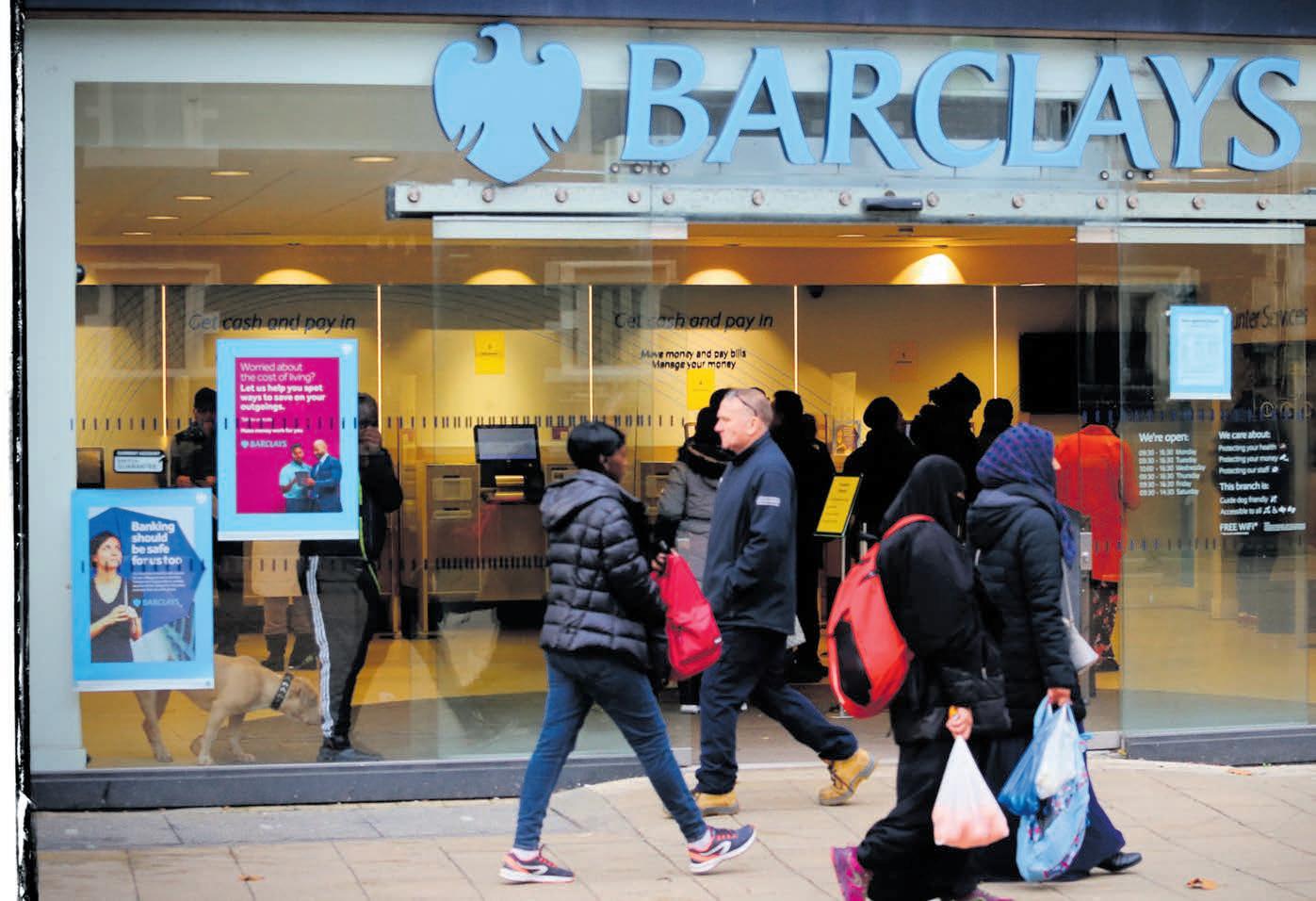
These plans are set to accelerate in the coming weeks, as the Swiss lender prepares to announce its second consecutive annual loss this month.
The push to cut jobs saw Credit Suisse make 2,700 of its staff redundant in December, including 540 workers in Switzerland and 200 in London. Credit Suisse currently employs more than 5,000 people in London and roughly 16,000 in Switzerland.
UK banks will not repeat financial crisis, says analyst

UK BANKS are now better prepared to withstand a jump in home loan defaults, cooling fears of a repeat of the financial crisis, analysts have told City A.M.
Strict affordability rules implemented after the 2008 banking crash have strengthened lenders’ loan books, meaning they are well insulated from a potential rise in defaults caused by any potential effects from last year’s upward march in mortgage rates.
“While it is tempting to look back to the great financial crisis, the comparisons between now and 2008 might reveal as many differences as there are similarities,” Russ Mould, investment director at AJ Bell, said.
Routine assessments of the sector by the Bank of England (BoE) – known as “stress tests” – and requirements to keep a larger chunk of cash on reserve to cope with a surge in loans being left unpaid or a Northern Rock-style bank run have shored up the likes of Barclays, Lloyds and Natwest’s balance sheets.
The average ratio of capital to risky assets has swelled from 4.5 per cent to 14.3 per cent, according to BoE data.

Sophie Lund-Yates, a senior equity analyst at Hargreaves Lansdown, said: “The




That dry powder may prove its worth if mortgagors fail to repay their debts due to rates doubling over the last year (according to Moneyfacts) and higher living costs eroding their budgets.
However, outstanding debt is beginning to look a bit shaky.
Some 750,000 people are at risk of defaulting on their home loans, according to the City watchdog the Financial Conduct Authority, raising concerns banks’ bottom lines could take a hit over the coming year.

Greater debt fragility may sour investor sentiment toward big banking stocks.
Top British high street lenders will start posting their full year 2022 earnings early next month.
Although they are expected to have bagged a juicy bump from higher interest rates allowing them to charge more for loans, there is a risk investors will ditch their shares if they sound an alarm over higher mortgage defaults.
Experts also do not think negative equity levels – when the value of a borrower’s unpaid debt tops their property price – are headed to the level rates hit during the financial crisis because of rules put in place over the past decade or so.
Consultations on plans for the next round of layoffs have now started, with more than 10 per cent of European investment banking jobs under review, the Financial Times reported. In some of Credit Suisse’s smaller European outposts, up to a third of jobs may be at risk.
A final decision on the redundancy plans is expected next month.

The plans come after Goldman Sachs last week began cutting 3,200 staff.
Credit Suisse declined to comment.

Think tank calls for tax changes to encourage low earners to save more
VICKY SHAW
A SHAKE-UP of incentives to help people save is needed to help more households build resilience against financial shocks, a think tank has said.
The struggle to save is a particular problem for low to middle-income households, with those in the bottom half of the income distribution
typically having £3,000 in savings per adult, the Resolution Foundation said.
Successive governments have attempted to address the struggle to save through a mix of tax reliefs – such as savings allowances and Isas – and direct support, such as Lifetime Isas and Help to Save.
The report noted savings allowances are progressive, but found support was
skewed towards wealthier savers. The report said Chancellor Jeremy Hunt should consider overhauling savings policies and focus on encouraging more people to save rather than rewarding those who already have very significant savings. It also suggested capping the total amount of Isa savings that are tax-free at £100,000, a policy that could raise around £1bn a year.

CITYAM.COM 06 MONDAY 16 JANUARY 2023 NEWS
Those in the bottom half of incomes typically have around £3,000 in savings
LOUIS GOSS
The Swiss bank is under intense pressure to cut costs
PA
Banks primed to snap up fintechs on the cheap



 CHARLIE CONCHIE
CHARLIE CONCHIE
THE UK’s fintech sector will see a wave of acquisitions this year as cashed-up banks and investment firms will swoop in to buy struggling firms on the cheap, a top venture capital chief has predicted.
Tim Levene, chief of London-listed venture vehicle Augmentum Fintech, said banks had failed to properly digitally transform over the past decade and would now be looking to shortcut innovation with a flurry of fintech dealmaking.










“I look at the balance sheets of the banks and the insurers and the asset managers and they’re sitting on a lot of a lot of cash, a huge amount of cash,” he told City A.M. in an interview.
“I would say the vast majority of the hundreds of millions that have been deployed and digital transformation [by traditional finance firms] has been wasted, and so they have to acquire, and acquire sensibly. I think we will see more [deals], because valuations have relatively dropped,” Levene said.
High-growth fintech firms suffered sharp falls in valuations last year as venture capital investment dried up amid sharp interest rate hikes and a shuttered exit market.









Prices slumped across nearly every stage of fundraising in 2022. Series D and later funding rounds saw valuations fall by 27 per cent in the third quarter, bringing them down to nearly 2020 valuation levels, a recent report from data firm CBInsights found.


Levene said the downturn in funding was likely to continue in the first quarter of this year as VC firms sit out turbulence and big institutional investors, who poured into the market in 2021, withdraw.




“I think you’ve seen a bit of a pullback from sovereigns, from hedge funds, the big names who have the view that you can hack venture capital and invest billions in a short period of time to spread your bets and pick the winners.” he said. “I think [that] has been proven to be a failure.”
Direct Line chief rushes to calm investors after shares collapse
LOUIS GOSS
DIRECT LINE’S share price “doesn’t reflect the intrinsic value of the company,” the insurer’s chief executive Penny James has said, after shares in the firm plummeted last week.
In an interview with The Sunday Times, James instead said Direct Line still has “huge

earnings potential” and said that she feels “very positive about the future prospects”.
James’ comments come after shares in Direct Line collapsed last week on news of its decision to scrap its 2022 dividend. The firm’s shares fell 28 per cent after the announcement on Wednesday morning and were continuing to trade 24 per cent down from their
Monday price at Friday close of last week.





In its announcement, Direct Line blamed inflation, plummeting property prices, and cold December weather for its decision not to pay out its 2022 dividend to shareholders. Inflation has driven up the costs insurers face in fulfilling claims, particularly in fixing and replacing cars.








Firms urged to ‘onshore’ supply chains amid rising global tensions
 LOUIS GOSS
LOUIS GOSS

LOGISTICS executives increasingly believe top companies should look to bring their supply chains closer to home to avoid being impacted by trade wars, sanctions and other global shocks, a new survey has found.

Supply chain managers increasingly see ‘onshoring’ and ‘near-shoring’ as a means of hedging against disruption to global trade caused by the pandemic, the Thomson Reuters report says.






















































More than three-quarters (78 per cent) of global trade executives polled said major companies should begin “diversifying” their supply chains to hedge against disruption to international trade, the survey found.
“Conversations on trade management issues – like supply chain stability, tariffs, sanctions, and customs compliance – have been thrust into the spotlight in recent years, and for good reason,” Brian Pecceralli, Thomson Reuters chief operating officer, said.






07 MONDAY 16 JANUARY 2023 NEWS CITYAM.COM
Reuters reported that Revolut is close to finalising its 2021 accounts, a move that could prepare it for a UK banking licence. Revolut is set to publish its accounts at the end of January. It was founded in 2015 by Vladyslav Yatsenko and Nikolay Storonsky.
READY FOR UK Fintech firm Revolut is preparing to publish its 2021 accounts
Levene said banks were looking for deals
Recruiters say recession to end legal pay war
LOUIS GOSS
A DROP in legal sector revenues is likely to see the end of the pay war that has played out between the City’s top law firms over the past two years, legal sector recruiters have said.
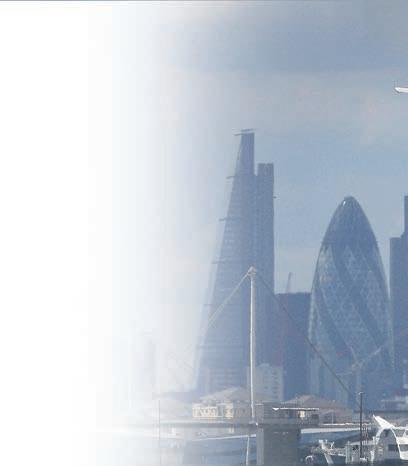
Falling revenues off the back of a slowdown in new business will likely see lawyers’ salaries plateau or even go into reverse, as law firms seek to control their costs, the recruiters said.
Scott Gibson, director of legal sector recruiter Edwards Gibson, said law firms “will have to” cut their fixed costs, as he warned salary boosts for newly-qualified (NQ) lawyers could feasibly go into reverse.
He explained a drop-off in work, largely as a result of a slowdown in M&A activity, is set to hit the UK legal sector’s revenues.
Recent figures from the UK’s Office for National Statistics (ONS) show UK legal sector revenues have already begun to drop, having fallen seven per cent from October to November 2022.
This drop in revenues will in turn put a kibosh on law firms’ expansion plans, as they instead seek to cut their fixed costs. Staff salaries are law firms’ main expenditure, Gibson said.
Julie Norris, a partner at London law firm Kingsley Napley, said firm leaders will have a “particular eye on keeping expenses under tight control when costs across the piece are soaring”.
Gibson noted that in past recessions, salaries for NQ lawyers have dropped, as firms have sought to cut costs in response to slowdowns in work.
He explained that NQ salaries dropped after the dot com bubble and the financial crash of 2008 as thousands of lawyers also lost their jobs.
In both cases, the cuts followed significant increases in NQ salaries, parking similar law firm pay battles.
Andrew Waters, managing director of legal sector recruiter Chadwick Nott, said the “consensus is [pay growth] cannot continue at this rate”.
The recruiter said he expects law firms to “be more conservative with recruitment” as he forecast a “slower first quarter” in 2023. Waters warned a drop in revenues could also see law firms seek to boost their profits by charging “higher rates” or instead forcing their lawyers to work “longer hours”.
The comments follow news that profit-per-equity partner (PEP) rates in top US law firms have dropped for the first time since 2009.
Debt write-off for Matalan but founder Hargreaves on his way out
CITY A.M. REPORTER
BRUISED and battered retailer Matalan is set to tell markets today it has been rescued by a debt-for-equity swap with its lenders, according to a host of news reports this weekend.
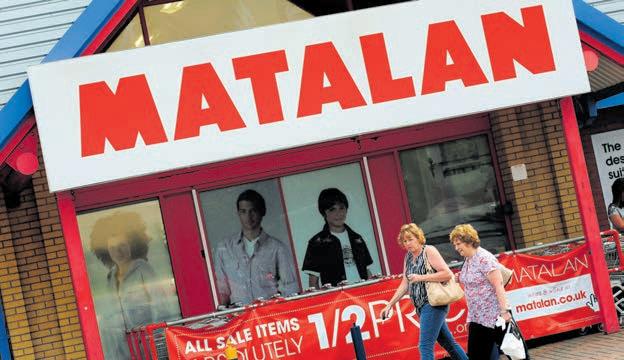
Founder John Hargreaves, who founded the fashion firm some forty years ago, is set to lose control of the
firm despite his own last-minute bid.
Lenders including Invesco will take control of the firm after a sale process failed to drum up sufficient attractive offers, according to reports in the Sunday Times and in Drapers.
Hargreaves will reportedly not be repaid a £50m loan he gave to the company during the pandemic.
He had attempted to team up in a


50:50 deal with investors Elliot Advisers. The deal will ensure around 11,000 staff remain in their jobs.
Sky News’ Mark Kleinman first reported that the lenders were keen to take control of the firm which has been hit by pandemic restrictions and systemic shifts in the way people shop.
Matalan has been approached for comment.
Law firms at risk of losing talent to burnout
 LOUIS GOSS
LOUIS GOSS
BRITISH law firms could struggle to retain talent if they do not ease workloads that are pushing burnout rates higher, new research reveals.
Nearly two in three UK legal professionals have experienced burnout as a result of their work despite the sector stepping up mental health support, a new survey out earlier this week of more than 200 lawyers shows.
Intensifying stress levels risk incentivising lawyers to switch to a firm with a better work life balance,
Business travel to bounce back in 2023 after hiatus, analysts predict
EXECUTIVES are set to ditch Zoom calls this year and once again take flights to conduct business in person around the world, industry experts have suggested.

Long-haul business travel is predicted to bounce back this year, according to analysts from aviation data and analytics firm IBA.
IBA’s managing director Geoff van Klaveren said he “did not believe
that the trend towards Zoom would last” and that people would begin to get back on planes to meet overseas clients.
“The outlook in our view looks strong,” he said.
According to IBA’s global travel forecasts, released late last week, capacity in 2023 will recover in most markets, especially between Europe and the Middle East as well as Europe and North America.
The transatlantic market will
increase 17 per cent year-on-year, the group predicted, while travels to and from the Middle East, and the Gulf in particular, are set to go up 25 per cent.
Nevertheless, all travel to most regions – apart from between North and South America – is still set to remain below 2019 levels.
During the pandemic it was speculated that Zoom would kill off the business travel industry, but such predictions seem incorrect.
with nine-out-of-ten lawyers surveyed now saying a more manageable workload would be a top priority when looking for a new gig.
More than half (57 per cent) said swelling pipelines of casework was the main stressor in their work, the poll by Realm Recruit shows.
Law firms have experienced a boom in demand for legal services since the start of the pandemic, due to an uptick in insolvencies and strong dealmaking activity.
The boom has, however, ramped up work for lawyers. A labour shortage has forced those still in the sector to
take on more cases.
Greater demand has prompted firms to step up mental health support to help staff deal with stress.
In March, Los Angeles’ law firm Latham & Watkins hired two mental health counsellors to work in its London office, with a view to offering 24/7 access to therapy.
The survey showed more than half (58 per cent) of law firms now offer mental health first aiders to their staff, compared to 45 per cent in 2021, while the majority (54 per cent) of UK law firms now also offer free or subsidised access to a counsellor.
CITYAM.COM 08 MONDAY 16 JANUARY 2023 NEWS
Founder John Hargreaves is set to lose control of the business he started
ILARIA GRASSO MACOLA
Nine-out-of-ten lawyers said a more manageable workload would be a top priority when looking for a new job








































ridays are a BIGDEAL Free hot drink buy any drink Download the app to get this offer
1.Notice is hereby given that, not less than two months after the date of the first publication of this notice and on behalf of The Master, Wardens and Commonalty of Freemen of the Art or Mystery of Clothworkers of the City of London (“The Clothworkers' Company”), Museum of London Archaeology intends to exhume remains of persons interred at the Churchyard as well as any tombstones, memorials or monuments.
2. A plan of the Churchyard, together with particulars of the deceased persons whose remains are proposed to be removed, is deposited at Museum of London Archaeology, Mortimer Wheeler House, 46 Eagle Wharf Road, London N1 7ED (Tel 020 7410 2200) and may be inspected free of charge between 9am and 5pm from Monday to Friday, excluding public holidays.
3.Subject to paragraph 6 below, Museum of London Archaeology proposes to arrange for all human remains to be removed and reinterred or cremated in accordance with the following conditions proposed by the Secretary of State:
a)the removal of the remains to be effected with due care and attention to decency;
b)the ground in which the remains are interred to be screened from the public gaze while the work of removal is in progress;
c)a suitable disinfectant solution to be freely sprinkled over the coffins and soil, if necessary;
d)the removal to be to the satisfaction of the environmental health officer for the district in which the remains are at present interred and in accordance with any additional conditions he or she may impose; and
e)the remains and any articles apparently buried with the deceased to be placed in fresh shells or such other containers as meet the requirements of the said officer.
f)The particulars of the deceased will be stored at Museum of London Archaeology, Mortimer Wheeler House, 46 Eagle Wharf Road, London N1 7ED (Tel 020 7410 2200) and may be inspected free of charge between 9am and 5pm from Monday to Friday, excluding public holidays.
4.Subject to paragraph 6 below any tombstones, memorials or monuments will be returned to the site at the end of the development phase and resited within the land now comprising the churchyard.
a)Prior to their removal, any tombstones, memorials or monuments will be accurately located and recorded and a copy of the records will be deposited with
the City of London and the Registrar General.
b)A copy of the records of the tombstones, memorials or monuments will be available at Museum of London Archaeology, Mortimer Wheeler House, 46 Eagle Wharf Road, London N1 7ED (Tel 020 7410 2200) and may be inspected free of charge between 9am and 5pm from Monday to Friday, excluding public holidays.
c)Before the tombstones, memorials or monuments are returned to site, they will be stored at John F Hunt, Hill Farm, South Road, South Ockendon, Essex RM15 6RR.
5.Subject to paragraph 6 below, the human remains will be removed and reinterred at Willow Cemetery, 61 High Road, Benfleet, SS7 5LH and in any intervening period will be kept safely, privately and decently.
6.Any personal representative or relative of any deceased person interred at the Churchyard, has the right to give notice in writing to The Clothworkers’ Company of Clothworkers’ Hall, Dunster Court, Mincing Lane, London, EC3R 7AH (marked for the attention of the Director of Finance, Property & Investments) by 9th day of March 2023 of their intention to make their own arrangements for the removal and reinterment (in any churchyard, burial ground or cemetery in which interments may legally take place) of such remains or the cremation of for the removal and cremation of such remains. Any person who elects to proceed with such arrangements will be required to provide a certificate to The Clothworkers’ Company pursuant to section 5(4) of the Allhallows Staining Church Act 2010.
7.Any personal representative or relative of any deceased person to whom a tombstone memorial or monument at the Churchyard relates, has the right to give notice in writing to The Clothworkers’ Company of Clothworkers’ Hall, Dunster Court, Mincing Lane, London, EC3R 7AH (marked for the attention of the Director of Finance, Property & Investments) by 9th day of March 2023 to request the reerection of the tombstone, memorial or monument (at such other places as the parties may agree).
8.The Clothworkers’ Company will meet any reasonable expenses incurred in connection with such removal and reinterment or cremation of the remains subject to section 5(6) of the Allhallows Staining Church Act 2010 and of removing and re-erecting any tombstone, memorial or monument.
Dated this day 16th of January 2023 For and on behalf of The Clothworkers’ Company
Harper: Train operators given ‘revised mandate’ for latest union talks
DAVID LYNCH AND PATRICK DALY
TRAIN company bosses will be working with a “revised mandate” which could include a better pay offer as they enter the latest round of talks with unions, the transport secretary has suggested.
Mark Harper said train operators have been given his “permission” to make a new offer to the trade unions.

The minister claimed he had made sure a “better deal” on pay was available to rail workers, as he continued to make the case for changing operating conditions on the railways.
Harper’s claims come as train operating companies, Network Rail and the trade unions are set to start the next round of talks over pay and conditions in an attempt to end the ongoing industrial action.
Harper told Sky News: “The train
operating companies have got permission from me to make a new offer to rail unions. That is what they are going to be doing. That is what I was asked to do, that is my role in the process.
“But it is important now that we give some space for the employers, so that is the train operating companies and Network Rail, to continue having discussions with the RMT to try and reach a conclusion.”
Pressed about whether his role in giving permission meant he had control over the negotiations, Harper said: “They have got a revised mandate to make an offer to the trade unions, to cover both pay and also im-
portantly reform.”
“They will be having those discussions this coming week,” he added.
Reports in the Financial Times newspaper in December suggested ministers have previously intervened to block a higher pay offer to rail workers.
Pressed about whether more money had been offered to the unions, Harper told the BBC: “I made sure after I met the trade union leaders that there was a better deal on the table for rail workers. But remember there is another side to it… which is also it is important that we get generational reform both on the maintenance side of the operation for Network Rail but also for the rail companies.”
This comes as ministers push for new laws requiring minimum levels of service on strike days in a bill due to be considered again by MPs today.
THE SUN reported that the figure is in relation to a Gibraltar-based family trust known as Balshore Investments. The trust was said to have held a stake worth circa £20m in YouGov, but sold up by 2018.
The Independent reported
Barclay defends controversial strikes bill amid GMB dispute
PATRICK DALY
THE HEALTH Secretary has told union bosses that the “voluntary arrangements” put in place during recent ambulance strikes were not enough to “ensure patient and public safety”.
Steve Barclay has written to the GMB setting out why minimum service levels needed to be set into law during “blue light” industrial action, which he said had the potential to “put lives at immediate risk”.
It comes as anti-strike legislation is due to be debated today by MPs.
The Cabinet minister, in a letter
seen by the PA news agency, said he had been asked to reply to the union on the Prime Minister’s behalf after it published an open letter saying ambulance staff felt “demonised” by ministers.
“During recent action I have not been reassured that the current system of voluntary arrangements can be relied upon to ensure patient and public safety,” the health secretary said.
Defending the controversial Strikes (Minimum Service Levels) Bill, Barclay said it would provide the public with “much needed assurance” of a certain level of critical care during strike action.
Iran executes dual national accused of spying
IRAN has executed a British-Iranian national who once served as its deputy defence minister, its judiciary said, defying calls from London and Washington for his release after he was handed the death sentence on charges of spying for Britain.
Also condemned by the US and France, the execution looks set to further worsen Iran’s long-strained relations with the West.
Foreign Secretary James Cleverly said the execution would “ not stand unchallenged” and later announced Britain had temporarily withdrawn its ambassador from Tehran.
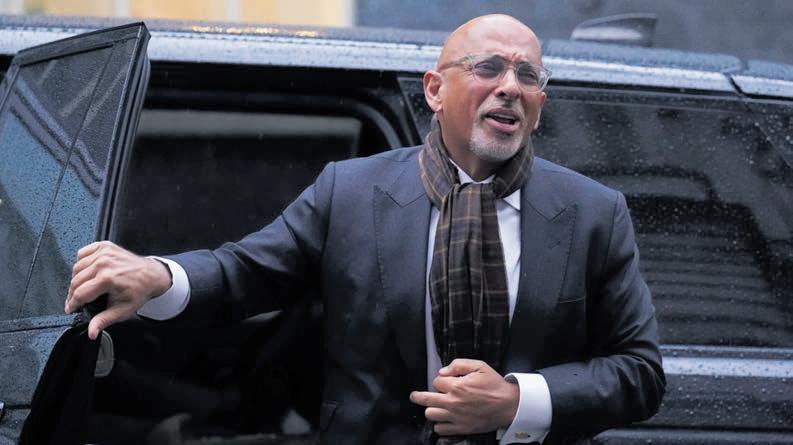 TOM PERRY
TAXING TIMES Former Chancellor Nadhim Zahawi set to pay out several million as part of a settlement with HMRC –reports
TOM PERRY
TAXING TIMES Former Chancellor Nadhim Zahawi set to pay out several million as part of a settlement with HMRC –reports
CITYAM.COM 10 MONDAY 16 JANUARY 2023 NEWS
last July that both the National Crime Agency and the Serious Fraud Office investigated his financial affairs. Zahawi denies all wrongdoing.
Notice under sections 5 and 6 of the Allhallows Staining Church Act 2010 of intention to remove human remains at Allhallows Staining Churchyard, located on the corner of Mark Lane and Dunster Court in the City of London, London EC3 (the “Churchyard”)
PA PA
Harper said there was a better deal on offer PA
NSURANCE COMPANY OF THE YEAR
The insurance sector has had an extraordinary year, dealing with natural disasters and climate change on the one hand and investing at pace on the other. This year we’re looking not just at insurers who are delivering for shareholders but those looking to take the lead in greasing the wheels of the British economy.
ACCOUNTANCY FIRM OF THE YEAR

Auditors and accountants have spent plenty of time in the spotlight in recent years, but some firms are leading the way in putting audit and accountancy’s reputation back on the right track - and some are choosing innovative ways to respond to today’s challenges.
2ND MARCH 2023 THE GUILDHALL

LAW FIRM OF THE YEAR
The City’s legal sector continues to lead the world even in the face of great global changes and an occasionally difficult political climate. We’re looking not just at the biggest players in the market but those that are looking to innovate through both acquisition and technological innovation and disruption.
BANK OF THE YEAR
Lenders might have expected things to calm down postpandemic, but the cost of living crisis put paid to that. We recognise those banks that are going above and beyond to support British business.
ANALYST OF THE YEAR
City watchers are more valuable than ever, and these analysts have consistently got the big calls right. We recognise those who put the hard yards in to know their businesses and sectors.

DEALMAKER OF THE YEAR
Getting deals across the line in a global climate that is ever more volatile is no mean feat. London remains at the heart of global M&A –and we look at the rainmakers who are still doing the business.
INNOVATIVE COMPANY OF THE YEAR
The City has always thrived on the back of innovation and these firms have it in their DNA. We honour the big ideas and fast-moving firms who are helping to define the future of the Square Mile.
ENTREPRENEUR OF THE YEAR
London has always been a home for risk-takers, and that hasn’t changed. We look at the driving forces behind growing and established companies alike, looking not just at the bottom line but highlighting those who are using markets and business to solve global problems.
INVESTOR OF THE YEAR
Never have markets been more difficult to predict - but even in a tough environment there are gains to be had. It’s those investors that still raise the eyebrows of City professionals in admiration.
ENVIRONMENTAL, SOCIAL, AND GOVERNANCE AWARD
‘ESG’ has never been more in focus than it has been over the past year, with the City going green at pace.
But it’s not just about saying the right things, but doing them – and using innovative new products to finance them, too. From big to small, businesses are on the sustainability march.
BUSINESS OF THE YEAR
We’re looking for the best of the best - the companies that have navigated economic headwinds and come out ahead. We’re looking for smart management, growth, and a willingness to do things differently.
PERSONALITY OF THE YEAR
The final and arguably most prestigious category will see City A.M. recognise the very best of the best in the Square Mile and beyond. The City remains a global financial leader - and it does so on the back of its people. Who will be this year’s big winner?

AWARD CATEGORIES THE CITY’S MOST HOTLY-ANTICIPATED AWARDS EVENING - AND AFTERPARTY - IS BACK FOR 2023 VISIT: cityam.com/awards-2023 FOR TABLES AND TICKETS: Please contact Darren.rebeiro@cityam.com NOMINATIONS FOR THE BEST OF THE BEST ARE OPEN NOW - GET YOUR ENTRY IN SOON
THE NOTEBOOK
Can we finally say the unsayable and start reforming the NHS?
As the NHS endures its annual winter crisis - before it moves into its inevitable summer crisis - thousands of doctors are reportedly heading off to work in Australia. Pay and conditions are better Down Under, according to those who’ve had enough of the pressures of working in the NHS. Patient outcomes are superior, too. Surely then we should be asking ourselves: how does the Australian system work, and should we try to emulate it? Of course, with the NHS it’s never that straightforward; traditionally, any notion that it could possibly be reformed is unsayable.
But that seems to be changing. Just yesterday, Labour leader Sir Keir Starmer said that the NHS must “reform or die”.
He said that “well-meaning reverence” for the health service has “supplanted reality”; it must not be “off limits” for criticism.
Talking about reform doesn’t seem so taboo.
Unfortunately, British public
services seem to be failing across the board. Indeed, we all have our own tales of woe: long delays booking a driving test; the new passport delayed; a burglary not investigated by the Police.
More taxpayers’ money needed, you say?
According to the OBR the government will spend £1.2 trillion this year, equivalent to around £42,000 per household.
Public spending is predicted to be 47.3 per cent of national income. That means the tax burden is at its highest in more than 70 years.
Reforming public services is good in and of itself - we pay for world class, 21st century services and should get them.

But it is also the only way to break the doom loop of throwing good taxpayers’ money after bad.
Step one? Stop deferring to Twitter noise as a measure of support or otherwise for an ideaa virus that has infected the private sector, too.
Debating ideas openly will weed out the bad ones and polish the good ones.
Our notebook gives interesting people the chance to say interesting things. Today, it’s John O’Connell, boss of the TaxPayers’ Alliance
UNINTENDED CONSEQUENCES
Treasury is reportedly considering giving the over-50s tax breaks to return to work. This will go down like a lead balloon with younger cohorts, already feeling hard done by. It feels unnecessarily complicated, too.

£ Jerome Powell offered sage advice to central bankers in Stockholm, telling them they should “stick to their knitting”. The Fed Chair was sounding a note of caution for rate-setters who stray beyond their remit and intervene in social issues. New research by the TPA shows that public bodies are dishing out £1.2m to charity Stonewall - despite being told to leave its controversial diversity champions scheme. Perhaps Powell’s words should be stuck on Whitehall noticeboards.
Israeli PM vows to persist with legal overhaul
AP REPORTERS
ISRAELI Prime Minister Benjamin Netanyahu has said his government plans to move ahead with an overhaul of the country’s judicial system, despite fierce criticism from top legal officials and protests against the changes that drew tens of thousands of people.
Netanyahu, who is on trial for corruption, has made the legal changes the centrepiece of his new government’s agenda and the surging opposition to them is presenting an early challenge for the Israeli leader.
The overhaul would weaken the power of the Supreme Court, granting legislators the ability to pass laws that the court has struck down with a simple majority, as well as give the government greater power over the appointment of judges and limit the independence of government legal advisers.
The proposed changes have sparked an outcry from the Supreme Court’s top justice, who in rare criticism called the overhaul an “unbridled attack on the justice system”.
The country’s attorney general has also spoken out against the plan, as have many of her predecessors.
Despite the opposition, Netanyahu told a meeting of his Cabinet that voters
cast their ballots in November elections in support of his campaign promise to overhaul the justice system.
“We will complete legislating the reforms in a way that will correct what needs correcting, will totally protect individual rights and will restore the public’s faith in the justice system that so much requires this reform,” Netanyahu said.
There have been calls in the past to reform Israel’s justice system, which was given greater clout in the 1990s and has been seen since by critics as being too interventionist in lawmaking.
But the sweeping changes sought by Netanyahu’s justice minister have raised alarm among opponents who see them as a death knell to Israel’s democratic fundamentals.
Netanyahu and his allies see the changes as a way to ease the process of governance and recalibrate what they say is an imbalance between the country’s executive and judicial branches.
Netanyahu heads a government of ultranationalist and ultra-Orthodox parties who at times in the past have seen their agendas thwarted by Supreme Court decisions.
Israel’s ceremonial President Isaac Herzog said he was working to avert “a historic constitutional crisis” that could emerge over the legal changes.
£ York Council has come under fire after spending £8 million on electric bin vans that can’t be used. They purchased the vehicles to replace their diesel fleet, although a local councillor claims they are standing idle as there aren’t enough electric charging points to get them going.
His broader beef is that the process has been badly managed but the council has hit back, claiming that it was wiser to buy the vehicles early due to inflation.

Fab forecasting, or slick spinning from the Council?
CAN I QUOTE YOU ON THAT?
Iain Duncan Smith on Rishi Sunak’s challenge - bring down taxes by the election, or face the consequences...
The economy grew in November, to the surprise of forecasters. December might be equally difficult to predict, with strong sales reported by many retailers likely to be checked by the impact of strikes. Growth, and how to get it, has been the underlying theme to the political turmoil of the last few months. But to get growth in the future, it’s important to understand how we got it in the past. Mark Koyoma and Jared Rubin’s book How the World Became Rich is a must-readespecially for our political classon how and why economic growth occurred when and where it did.One theme that the authors explore is the importance of culture in achieving sustained growth and declining poverty. It’s something we must learn frommoving with the times is one thing, but allowing Western values to be chipped away at could leave us all poorer in the long run.
Dozens dead after Russian attack in Dnipro
UKRAINE said there was little hope of pulling any more survivors from the rubble of an apartment block in the city of Dnipro yesterday, a day after the building was hit during a major Russian missile attack, with dozens of people expected to have died.

President Volodymyr Zelenskiy said a child was among 25 people confirmed dead so far and 73 people had been wounded, including 13 children. Thirty-nine people had been rescued but a further 43 were missing, he said on the Telegram messaging app.
Emergency workers said they had heard people screaming for help from underneath piles of debris from the nine-storey apartment block in the south-central city and were using moments of silence to help direct their efforts. Freezing temperatures added to rescuers’ concerns.
“The chances of saving people now are minimal,” Dnipro’s Mayor Borys Filatov told Reuters. I think the number of dead will be in the dozens.”
Filatov said a Russian Kh-22 missile had struck the apartment block in the east-central, rocket-making city of Dnipro, destroying two stairwells totalling around 76 flats.
In a statement yesterday about its previous day of strikes, the Russian defence ministry did not mention Dnipro as a specific target.
“All assigned objects were hit. The targets of the strike have been achieved,” it said.
A spokesperson for Ukraine’s southern command said Russia had fired only half of the cruise missiles it had deployed to the Black Sea during Saturday’s attacks.

CITYAM.COM 12 MONDAY 16 JANUARY 2023 NEWS PA
Taxes are too high - but he knows that
The
Would we see comfortably off bosses coming back to work for a bumper payday, then retiring again without paying tax? What about Premier League football managers - would Sam Allardyce count if he came back for a new job? Surely that’s not what is intended, so how would it be prevented? With more complex rules, presumably.
A PAGE
WITH MEANING
TURNER
Russia fired two waves of missiles at Ukraine on Saturday
HERBERT VILLARRAGA
Russia fired two waves of missiles at Ukraine on Saturday, striking targets across the country as fighting raged on the battlefield in the eastern towns of Soledar and Bakhmut.
Reuters
LONDON REPORT BEST OF THE BROKERS






First data dump of the year to reveal if the UK tipped into recession
THE FIRST big data dump of 2023 in the coming week is set to unveil more clues on whether the UK economy entered a recession in the final months of last year.

City traders are hoping fresh inflation figures out on Wednesday from the Office for National Statistics (ONS) will show price pressures are still easing. The consensus forecast is for the rate of price growth in the UK to have dropped to 10.5 per cent in December, down for the second month in a row.
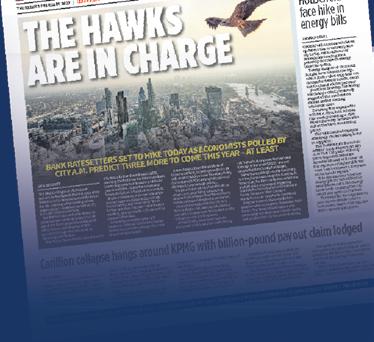


Another slide in the inflation rate will raise hopes that it is on course to gradually fall, reinforcing signs from last week’s stronger 0.1 per cent GDP growth figure for November that the UK’s recession could be reasonably mild.
“Core goods inflation will also likely show another soft print as weaker de-




















mand continues to dampen price passthrough. And we expect to see food inflation slowing too — in line with recent survey data,” Sanjay Raja, senior UK economist at Deutsche Bank, said. The better than expected GDP numbers helped bump the FTSE 100 to near its all time high of just over 7,900 last week.

Rate setters at the Bank of England are probably going to pay closer attention to Tuesday’s ONS jobs market and unemployment numbers for November to try and unearth clues on whether inflation could stick around. Private sector pay growth has raced to a multi-decade high due to workers demanding employers step up wages to offset the cost of living crunch. This has raised businesses’ costs substantially, raising incentives for them to hike prices to maintain margins, heightening the risk of an inflationary spiral emerging.
PERSIMMON
drop in demand for newbuild homes due to the mortgage crisis is set to hit housebuilder Persimmon’s balance sheet, Peel Hunt’s analysts said, as they forecast a significant drop in sales, particularly from first-time buyers. The analysts however said shares in the York building firm are still worth holding onto, as they dropped their price target to 1,250p.

BAILEY TO WATCH NEWS
FLOW CLOSELY “2023’s news flow will ramp up substantially this week. New inflation, jobs and retail sales numbers are set to land. BoE chief Bailey will be closely watching the rate of wage growth in tomorrow’s jobs data. Last week’s shock GDP rise means a 50bps rate hike’s on the table on 2 Feb.”
JACK BARNETT, ECONOMICS EDITOR

13 MONDAY 16 JANUARY 2023 MARKETS CITYAM.COM
P 9 Jan 13 Jan 11 Jan DFS FURNITURE 13 Jan 162 152 12 Jan 10 Jan 154 156 160 158 162
P 9
13
A
To appear in Best of the Brokers, email your research to notes@cityam.com
Jan
Jan 11 Jan
13
12
Jan 1,416 1,260
Jan 10 Jan 1,280 1,300 1,340 1,320 1,360 1,380 1,400 1,420
CITY DASHBOARD YOUR ONE-STOP SHOP FOR BROKER VIEWS AND MARKET REPORTS
GET YOUR DAILY COPY OF DELIVERED DIRECT TO YOUR DOOR EVERY MORNING SCAN THE QR CODE WITH YOUR MOBILE DEVICE FOR MORE INFORMATION IT’S FINALLY HERE RIVALRIES RENEWED AS THE SIX NATIONS RETURNS FOR 2022 8-PAGE PULLOUT 2022 SIX NATIONS ENERGY D-DAY Households LONDON’S BUSINESS NEWSPAPER FREE CITYAM.COM THURSDAY 10 FEBRUARY 2022 CITYAM.COM COOL RUNNINGS ALL THE GEAR FOR AN OVERDUE MOUNTAIN BREAK P20 STATE SET MAN IN THE KNOW MARK KLEINMAN GETS THE CITY TALKING P13 LONDON’S BUSINESS NEWSPAPER LONDON’S BUSINESS NEWSPAPER CITYAM.COM Climate noise blocking out THROUGH THE DRINKING GLASS THE LATEST FROM OUR WINE GURU P22--ISASUNWR – WHERE T PUT MONEYTHIS YEAR WEDNESDAY FEBRUARY 2022 ISSUE 3,677 THE ULTIMATE SAVINGS GUIDE ALL YOU NEED TO KNOW ABOUT YOUR ISA P19-21
DFS Furniture’s share price does not reflect the strength of the sofa seller’s position, according to analysts at Peel Hunt, who said the Doncaster firm’s ability to spend on marketing and offer interest free credit deals on furniture gives it a competitive advantage over its rivals. Peel Hunt’s analysts said shares in DFS are a “clear Buy” as they gave it a price target of 200p.
EDITED BY SASCHA O’SULLIVAN
Ukraine is a real life learning curve of the price of modern war and defence
Eliot Wilson
FOR those of us old enough to remember the war in Iraq, it is an unusual sensation to find in Ukraine a British military commitment which enjoys substantial public support. Of course we are not actively engaged in the war against Russia to defend Ukraine’s independence, and there is no substantial body of opinion which calls for UK boots on the ground.
Nevertheless, as the conflict approaches its first grim anniversary, we remain the second-biggest contributor of military aid to Volodymyr Zelenskyy’s government after the United States. In 2022, the UK government supplied £2.3bn worth of equipment and training, and will maintain a similar level of commitment in 2023.

Our support for Ukraine is, in geopolitical terms, fairly altruistic. We are backing Zelenskyy because Russia has clearly committed an unprovoked and unjustifiable act of aggression against a neighbouring country, and while it is, to a degree, a warning to others, it is also plainly the right thing to do.
While we open our coffers, we should make sure that we pay attention to where the money is going and learn lessons of modern warfare.
The war in Ukraine has been a distinctive conflict. It was, to begin with,


a reputational earthquake. As one cynic remarked early on, we used to think that the Russian Army was the second-best in the world; now it’s not even the second-best in Ukraine. But Russia’s military humiliation has not just been due to shabby equipment and dismal morale: they have seemed utterly unprepared for the kind of war which the Ukrainians have waged.
Three key weapons of war have been drones, anti-tank missiles and anti-aircraft missiles. Stiff Ukrainian resistance using all of these weapons blunted the Russian attack from an early stage and it is significant that missile systems have been a major part of our contribution to the country’s capabilities. Since
before the conflict even began, we have been supplying lightweight, shoulderlaunched, fire-and-forget anti-armour missile launchers known as NLAWs which have been devastatingly effective. One Ukrainian officer suggested these cheap weapons have accounted for between 30 and 40 per cent of all Russian vehicles destroyed.
We have also supplied air defence vehicles and anti-aircraft missiles. These have contributed to denying Russia air superiority, which had severely compromised their ability to carry out strikes against Ukrainian ground forces and military and civilian infrastructure. Dominance of the airspace has been a prerequisite of effective of-

fensive operations since the abandoned German invasion of Britain in 1940, and it has helped Ukraine stay very much in the game.
It is clear Russia will not achieve anything like a conventional victory. Indeed, President Putin is still very much at risk of humiliating and perhaps fatal defeat. But the Ukrainian conflict has not happened in a vacuum. It has taught us—or it should have done—that territorial defence can be achieved with relatively cheap, disposable weapons operated by a well led military force with high morale. It has also reinforced the resource disparity which our more sophisticated weapons systems embody: even a
Russian T-90 main battle tank costs in the region of $5m, and if it is destroyed or taken out of service by a man-portable NLAW costing less than $40,000, that is a financial disparity which cannot be sustained.
International opinion is also critical. Ukraine has boosted its cause immeasurably by the skilful diplomacy and charisma of its president. His response to a US offer of evacuation, “The fight is here; I need ammunition, not a ride”, was iconic and he has won the support of nations across the world. The contrast with the remote, waxen, bloated Putin is glaring. In an interconnected world, none of us can afford to be isolated.
The UK still struggles with its international military posture. Although we are unlikely to face physical invasion by a larger neighbour in the way Ukraine has done, the course of the conflict should cause us to consider our strategic options. We have pursued a course of concentrating our resources in a relatively small number of high-value assets, prizing capabilities which are first-class over mass and deployability.
We have not fought anything resembling a conventional war against a state actor for 30 years; when we inevitably have to do so again in the future, we must be sure that we have prepared not only adequately but appropriately. The armed forces have not always proved successful at learning lessons in the past, so we should study conflicts in which we have a stake, like that in Ukraine, especially closely.
Wilson is co-founder of Pivot Point and a columnist at City A.M.
London’s streets aren’t paved with gold but we do help direct investment across the UK
ACROSS the UK, households and businesses are facing a challenging outlook in 2023 amid a cost-of-living crisis. This is just as true in London as it is in other parts of the country. A recent poll found that 77 per cent of people think living costs are the most important issue facing the capital.
London is one of the most unequal places in the country, with some 2.5 million Londoners living in poverty. This means that the mission to “level up” our economy and create opportunities for all is vital to Londoners just as it is for the likes of Manchester, Liverpool and Newcastle.
But for too long London has been portrayed in this narrative as a sponge soaking up limited financial resources, stunting the growth of other cities. This view wrongly presents London as part of the problem, when in fact it is a pivotal part of the solution.
Last week, the Mayor of London and leaders from across the capital joined me at the Mansion House to discuss
Nicholas Lyons

this issue. It was clear to all that London needs levelling up as much as anywhere else in the UK. Our streets are not paved with gold.
At the same time, the capital also has a critical part to play in ensuring that vision becomes a reality.

London makes a huge contribution to the UK not just via the taxes and business rates it collects, but also by the investment it attracts, and the projects and industries it funds. For example, a Leeds company was contracted to prepare the city’s sewer networks for the new Elizabeth Line and its trains were built in Derby.
Many people associate the financial

and professional services sector solely with London but it is a significant driver of jobs and prosperity across the country. In the decade to 2020, all areas across the UK saw the value of their financial and professional services output grow by between 15 per cent and 49 per cent. And, today, twothirds of the 2.3 million people who work in the sector are based outside of London.
I’ve worked in the Square Mile for 40 years, and remember when London was seen as a city in decline. Our financial institutions and infrastructure demonstrate our resilience in the face of economic turmoil .
Yet last year, London’s position as Europe’s largest stock market was challenged, albeit briefly, for the first time since records began. This reminds us that the City’s – and London’s success – is not inevitable. If we want our financial sector to continue to be the engine of the UK’s economy, now’s the time for a jump start. The chancellor’s Edinburgh Reforms and the Financial
Services and Markets Bill is a welcome step in the right direction.
Of course, a successful City must also play its part in creating a fairer capital.
Last year, the City of London Corporation submitted plans to Parliament to relocate the historic Billingsgate and Smithfield markets to a purpose-built site in Dagenham Dock. Around 42 acres of industrial land will be transformed: stimulating the local economy and bringing around 2,700 new jobs to the area. Meanwhile, the City Bridge Trust awards around £28 million each year to support disadvantaged communities across London.
The objectives that sit behind levelling up are more relevant now, than ever. But the narrative needs to change and caricatures of London must be cast aside. Instead, the capital should be included in levelling up as this mission cannot succeed without a thriving London.
£ Nicholas Lyons is the Lord Mayor of the City of London Corporation
JETSETTER LIFE

CITYAM.COM 14 MONDAY 16 JANUARY 2023 OPINION
OPINION
£ Eliot
Vlodomyr Zelensky has become an icon of Ukrainian resistance
The Earth should brace for impact this week as politicians, business leaders and billionaires fly into Davos for the World Economic Forum. At last year’s conference, private planes emitted the equivalent of 350,000 cars. Good thing Rishi Sunak isn’t
Why you’ve not got any mail
THEcyberattack on Royal Mail shows that cyber threats continue to cause major disruption. With cyberattacks against a national mail system, cyber criminals can grind countries to a halt – demonstrating the power they have. And such power is only amplified if the attack targets critical

infrastructure or any assets or systems that shape a country’s economy or society.
We’re all on a journey to cyber resilience.
But progress will only be made if industries and organisations such as Royal Mail come together to share their learnings and experiences if and when they suffer an attack.
This process is a continuous one and can only be effective by creating a digital trust workforce that spans departments and sectors to collaborate closely against threat actors.
Chris Dimitriadis ISACA


A ROYAL MISTAKE The backlog of parcels and letters at Royal Mail grows
Open banking success has cracked the code for more tech innovation in the UK
Andrew Griffith
Do you trust your neighbours? It turns out the answer to this question doesn’t only depend on whether they blast Justin Bieber from their speakers at 4am on a Wednesday - I can assure you, not a pleasant experience - but also on where you live.
Different areas of the country have different levels of “social trust” in those around you. The most trusting neighbourhood in England is Ecclesall in Sheffield, where 62 per cent of residents say they “always or usually trust others”, according to research by Onward out today. Lovely
neighbourhood vibes - explained by the fact that Ecclesall is one of the least socially deprived neighbourhoods in the country.
In our capital, the winner is the City of London, where again 62 per cent of residents say they trust others. Could this have anything to do with the fact that barely anyone lives in the City?
The resident population is around 9,000 people - compare that to the 218,900 living in Barking and Dagenham. Easy to trust your neighbour, when you don’t have one.
 ELENA SINISCALCO
ELENA SINISCALCO
WE’RE living in an era of rapid technological change, with new ideas constantly exploding into life. But this change doesn’t just happen: it’s driven by entrepreneurs who have a desire to go further, to disrupt the status quo, and to bring to market new products and ideas.
This government wants to do everything it can to encourage this entrepreneurial spirit - to unlock the untapped potential technological advancement can bring to every town and city, and to grow the economy. This is why embracing technological change is one of the pillars of our financial services strategy, which was set out by Rishi Sunak during his time as Chancellor.
As the late Steve Jobs once said: “innovation distinguishes between a leader and a follower.” And he was right; Apple has continually embraced technological change, allowing people to connect with anyone, at any time, almost anywhere around the world. And it’s with unleashing innovation in mind that at the Autumn Statement, the Chancellor committed to reform EU-derived laws that have held us back in five exciting industries.
These plans include reforming our financial services regulatory framework – which we announced last year as the Edinburgh Reforms. This year we’ll be reforming the rules governing digital technology, life sciences, green industries, and advanced manufacturing.
For those who question whether we will achieve this, you only have to look at the stunning success of UK fintech, which supports tens of thousands of jobs, with booming clusters in Cardiff, Belfast, Manchester and Edinburgh. And despite challenging economic headwinds, the sector is still attracting more investment to the UK than the next ten European countries combined, and is second globally only to the US - where I have spent the last week encouraging more stateside capital to flow through to UK businesses.
A significant portion of the UK’s fintech sector uses open banking – a relatively new technology. But it’s a fantastic example of the seemingly hidden benefits new technologies can bring. If you access multiple accounts
that you hold with different financial institutions - such as a bank - in one app, you are probably already using open banking technology. It is estimated that 6.55 million adults in the UK already do. Research shows that a net 69 per cent of people using the technology found it easier to keep track of spending – and 55 per cent of people found it easier to budget.
More broadly, the technology enables fast, reliable, and low-cost payments, allowing businesses to be paid instantly and to save money. In some cases, it offers a competitive, cheaper alternative to card schemes. In December alone, 7.5 million payments were made in the UK using open banking, up 230 per cent year-on-year. There are over 200 providers of open banking in the UK, more than five times as many as our closest European rival, and over 600,000 small and medium size enterprises are using the technology to improve their businesses.

None of this progress would have been possible without the work of the Open Banking Implementation Entity, which last week confirmed delivery against its roadmap set by the Competition and Markets Authority. And it’s also important to recognise the contribution made by UK banks, who have funded and supported work to date – often themselves investing in pioneering open banking start-ups. My task now is not just to lock in this progress – but to build on it to ensure the benefits of open banking technology and broader innovation are felt by as many people and businesses in the UK as possible. Because as the Prime Minister set out in his New Year’s speech, we need to change the way our country works and raise our aspirations, to deliver a more innovative economy that creates better-paid jobs.
£ Andrew Griffith is a Conservative MP and the Economic Secretary to the Treasury
St Magnus House, 3 Lower Thames Street, London, EC3R 6HD Tel: 020 3201 8900
Email: news@cityam.com

Certified Distribution from 30/5/2022 till 01/07/2022 is 79,855
0203 201 8900, or email distribution@cityam.com
Printed by Iliffe Print Cambridge Ltd., Winship Road, Milton, Cambridge, CB24 6PP Our terms and conditions for external contributors can be viewed at cityam.com/terms-conditions Distribution helpline If you have any comments about the distribution of City A.M. please ring
Editorial Editor Andy Silvester | News Editor Ben Lucas
Comment & Features Editor Sascha O’Sullivan
15 MONDAY 16 JANUARY 2023 OPINION CITYAM.COM
Lifestyle Editor Steve Dinneen | Sports Editor Frank Dalleres Creative Director Billy Breton | Digital Editor Michiel Willems Commercial Sales Director Jeremy Slattery
WE WANT TO HEAR YOUR VIEWS › E: opinion@cityam.com COMMENT AT: cityam.com/opinion
[Re: Royal Mail’s export service hit with major cyber incident and is experiencing ‘severe disruption’, 11 January]
LETTERS TO THE EDITOR
EXPLAINER-IN-BRIEF: TRUST THY NEIGHBOUR IS A LESSON FOR MICHAEL GOVE
More than 6.5 million adults in the UK use open banking
Royal Mail is working to sort out the backlog left in the wake of a cyberattack last week, allegedly at the hands of a ransomware group linked to Russia. More than 400,000 items are sent most days in Britain.
TRAVEL IF YOU GO DOWN TO THE WOODS TODAY
Much Better Adventures takes Adam Bloodworth out hiking to spot Italy’s critically endangered bears

In some ways going on a bear hunt is exactly how I’d imagined it would be. Approaching a clearing at the edge of a forest, I’m instructed to creep on tiptoes, avoiding the menacing crunch of leaves which could be loud enough to send a Marsican brown running for the hills. I can’t help but wave my arms back and forth to keep my balance as I tread lightly, doing my best clown impression. “A broken twig could do it,” warns Andrea, my guide, piling on pressure. I start to consider stopping breathing entirely to increase our chances of achieving silence and as a result, arriving face-to-face with a big fluffy fellow like the one I imagined as a child when I read “we’re going on a bear hunt.”
I’m in Italy’s Abruzzo Mountains with the Much Better Adventures travel company, two-and-a-half hours north of Rome by transfer in an area so remote that international tourists are a rarer sight than bears. Locals probably have their binoculars pointed in my direction instead of at the wildlife. “Dio mio,” they’d shreak: “Un inglese nel Abruzzo!”

Not that many Italians visit this remote region either - except particularly keen hikers. Walking through Abruzzo’s Pescasseroli village is an arrestingly authentic experience, especially in October when the handful of Italian tourists have gone home. In Pescasseroli, a beer, two glasses of wine and a coffee in the central square costs $13 and an incredible ravioli at A Cav’ut restaurant comes with a complimentary side of banter from the genial owner. But every time I look up and out, away from the town’s pretty buildings, I’m reminded why I’m here: to get into the mountains that soar on every side. I’m not just here for the thrills. Over the past ten years, Abruzzo has been a triumphant rewilding success. The national park has created wildlife corridors to the north to increase biodiversity in plants and animals, strengthening the natural ecosystem and providing a blueprint for other countries considering rewilding. The term relates to the process of introducing animals back to their native environments and similar experiments are happening in the UK. There are only 70 Marsican brown bears left in Italy, making them critically endangered, but 20 have recently been sighted out of Abruzzo, a sign the corridors are working and the animals feel comfortable lumbering to new territories. They need giant swathes of land to breed and amazingly, numbers are going up, an incredible symbol of success. Excitingly, being on this trip will help sustain projects to protect the bears and other animals like wolves further.
are wild. Bears and wolves have been part of the ecological landscape “forever,” Andrea tells me the following morning over a headache-inducingly early 6am breakfast in the retro Hotel Iris’ restaurant which doesn’t look like it’s been updated since the 1970s. (And it looks fabulous for it.) I’d been jolted from sleep by my alarm clock, the only reprise being the sponge cake and jam I’m encouraged to scoff. The idea is that the complex carbs will fuel a day of hiking and at shortly before 7am we pull up after a 20-minute drive on the edge of a cliff as the sun threatens to brighten the dimness of the pre-dusk.
Abruzzo and the new corridors are the last place in Western Europe where bears Panoramic







CITYAM.COM 16 MONDAY 16 JANUARY 2023 LIFE&STYLE
scenes at Abruzzo National park
We creep across the bush and get comfortable with our hoods up and three jackets to stave off the cold. We’re glancing across the valley to a mountain on the opposite side where wolves hunt roe deer. Bears and wolves are nocturnal so the best chance for humans to see them with the naked eye is one hour at dusk and dawn when they’re creaking into action or getting ready to tuck up for bed.
A newbie to wildlife watching, I feared I wouldn’t concentrate for two hours. Wouldn’t standing in one spot looking out at craggy rock be boring?
Not at all: the privilege of being ‘allowed’ to stand and do nothing, in silence, with like-minded folk, is intensely moving. After half an hour, you actually start to feel part of the environment. My place in nature felt shifted. I was still a voyeur, like if I were watching animals from a car window at a Disneyfied safari park, but something had changed. I felt, what’s the word? Relaxed? Certainly more at peace. “Staring at things is never time wasted,” wrote the essayist Diana Athill. It had never felt more profound.
Later, after another visit to the cheeky ravioli purveyor - and wine merchant - I was trekking past bushes full with ripe buckthorn berries popular with bears, even picking the odd one to enjoy the aromatic taste. We were on a gentle incline into the deep forest and the pastures on either side werelightly green-yellow with the turning seasons. In the forest the only toilet was the ground but our instinct to wait for the group to walk ahead before we weed was a reminder we hadn’t entirely assimilated with nature. After a few hours’ hiking, sometimes up through winding and steep charcoal-coloured gorges, we stopped in a fantastic clearing. Andrea, reminding us to be silent, waved his arms for us to sit, where we remained for an hour as our long vision began to falter as the light diminished into night.
My hopes were fading but Andrea beckoned us forward forty metres and






around to the right. He couldn’t find the right words in English but had quickly begun interchanging his binoculars and his long-lens camera frantically, and it seemed like he was trying to get a better view as the light sank further. That the animals appear as the light goes feels incredibly cruel, but at least it focusses your attention. “A beautiful beast!” shouted Andrea. Just in sight through binoculars was a silver-grey slug-like shape in the bottom of a rough sand pit by the fringes of the forest. It was a pair of wolves, and through the camera, they danced, making interesting shapes with their bodies as they explored the land with their first sniffs of the day. I couldn’t see them with the naked eye but we multi-tasked, keeping our eyes on the wolves as we communicated with one another in broken language - “Left a bit! Down a bit! - helping each other spot the creatures before they faded
NEED TO KNOW
£ Much Better Adventures run Abruzzo National Park trips from May to October. The next ones begin 3 May and 28th June

£ Trips last four days and are £850, including guides, accommodation, transfers, breakfast and dinner and equipment like binoculars
£ Brown bears, wolves, wild boar, chamois and golden eagles are all possible to spot en route



£ Expert local wildlife trackers and conservationists join you for walks

£ Muchbetteradventures.com to book
into the night. Two hours of serenity, of sitting calmly and breathing, had been so sharply cut by the excitement of what we had come here for.
Half an hour later, a lemon yellow light flickers, and then another, the only unnatural sight to contrast with a billion stars overhead. We were somewhere even wilder than where we were before. The light comes into perspective as we near and a door is thrown open where a wood fire crackles and a three-course meal of pasta, lentils, chicken, broccoli and waffles - and tempranillo - awaits. I had never been anywhere so remote. At night it was cold but I was satisfied and cosy enough that I slept, leaving our hunter pals to take on consciousness in the vast darkness beyond.
The overnight refuge was a once-ina-lifetime experience, and we were to try more hikes the following days, each as mindful as the last. More often than not, I found it easier than I normally would to feel present, to keep my mind being flooded with chaotic information like it is back home. We’d hear a woodpecker, or see an eagle, and break our pact of silence for a brief moment.
A final morning trek had us surveying the usual spots - open plains, fruit trees, mountaintops - for bears. We saw claw marks, bear hairs from where they rub against trees like Baloo in The Jungle Book and we even saw one recorded by a night camera set up on a tree. But we weren’t to come face-toface with a Marsican brown.
As the trip went on, the idea of seeing one felt increasingly superficial. The thrill of the possibility of seeing a bear was exciting, but now I was part of their world. They were no longer some exotic creature with the sole job of dancing around for me to take photos of: it was apparent that they are an everyday part of this amazing mountain range and the true reward was spending three or four days here rethinking everything I’d ever known about the wild outdoors. It was - to rely on that overused sentiment - about the journey.
17 MONDAY 16 JANUARY 2023 LIFE&STYLE CITYAM.COM
A newbie to wildlife watching, I found the privilege of being silent and still in nature for hours intensely moving
We saw bear claw marks, hairs from their backs where they rub themselves against trees like Baloo in The Jungle Book. I felt I was part of their world
A fully grown female Marsican brown bear looks after her cubs in the Abruzzo National Park, reachable two hours’ drive north of Rome by car
Wolves are easier to spot than bears, but still nocturnal
The footprints of a bear in the mud from the Abruzzo National Park
The questions Borthwick must answer today
LATER this morning the new England rugby head coach Steve Borthwick will name his inaugural national squad ahead of next month’s Six Nations.
There are nine months until the World Cup and the former Leicester Tigers head honcho is expected to pick a group dictated by Premiership form.
And with such a short time to get England back to winning ways, today’s squad will be pivotal in understanding what type of game Borthwick wants to impose on his players.
Here are three themes to look out for.
PULLING THE STRINGS
A couple of weeks ago, with Marcus Smith still out injured and Owen Farrell potentially facing an extended ban for a high tackle, some were suggesting that Northampton and former Worcester fly-half Fin Smith could

Personality
make his international debut in the Calcutta Cup versus Scotland.
Just a fortnight later, however, Marcus Smith is back playing – he featured in Harlequins’ loss versus Racing 92 yesterday in Paris – and Farrell has avoided a ban long enough to see him excluded from the Championship.
So who do you pick?
The player who has grown into the England No10 shirt in recent years –Smith – or the in-form fly-half in England right now – Farrell.
Both will be in the squad and both are likely to be involved in a matchday 23, but the interesting selection choice to watch is that of Smith – does Borthwick take a look at the 20-year-old.
BACKS AGAIN
After his outstanding performance for Saracens at the weekend, Elliot Daly may have done just enough to earn a spot back in the national setup. He and Ollie Lawrence – formerly of Worcester and now Bath – have been brilliant for their respective clubs, as have Guy Porter of Leicester and Henry Slade of Exeter Chiefs.
It seems as if England have options again at centre, and that’s something they’ve been lacking of late.
A fit and firing Manu Tuilagi, too, will add some bulk to any
England midfield. Most of the other nations in the Six Nations Championships have skilful centre partnerships, and Borthwick will need to help develop one of those in the coming nine months.
Assuming Farrell starts at No10, there are a number of options for Borthwick to play with at No12 and 13 – a second playmaker or a pair of bulldozers.
It’s set to be a hotly contested position, but England should look at Daly for outside centre.
FORWARDS THINKING
For a number of years being the English player of the season in the Premiership has coincidentally meant not playing for England the following year, but that should change next month.
Because in Ben Earl, England have a flanker to compete with the best in the world. His workrate is exceptional and he’s exactly the dogged performer England will need against the likes of Ireland and France.
It’s also worth keeping an eye on whether the dynamic prop Val RapavaRuskin makes the squad, as well as the Willis brothers, Jack and Tom.
There are, as always, so many brilliant options in the pack – a real headache for Borthwick.
ILITERALLY grew up seeing Serena Williams succeed on the Grand Slam circuit – and now I'm desperate to see Nick Kyrgios, too, become a true star of tennis.
I was a newborn when Williams won her first singles title in 1999 and I was just months away from legally being able to drink in the UK when she won her last, in Australia six years ago.
She, along with the men’s big three of Rafael Nadal, Roger Federer and Novak Djokovic, have been instrumental in keeping tennis relevant, exciting and a sport perfectly placed to be transferred to the next generation.
So why, then, am I about to advocate for a 27-year-old to become the leader of the next era of tennis?
Well, because he’s Nick Kyrgios.
The boisterous Australian hasn’t done too much to help his popularity with umpires, fellow tennis players and tournament organisers – but everyone wants him around because he continues to be a breath of fresh air in a world where viral moments can matter almost as much as winning trophies.
It’s fair to say that the days of players getting 20-plus Slams are unlikely to be repeated soon so longevity and dominance must be replaced with competitiveness and personality.
Kyrgios provides that.
Have I moaned in the past about his spells of petulance?
Of course I have.

It’s something he needs to temper (no pun intended) but not dismiss entirely.
I am excited when I see him and his giant grin walk out at the Rod Laver Arena, Centre Court and Arthur Ashe Stadium because I know I am in for a show.
He may never dominate like Serena or have the ruthlessness of Djokovic –as we saw when they met in last year’s Wimbledon final – but he has an aura I fall in love with.
He is good enough to win a Grand Slam, albeit his potential run to Australian Open glory – which begins on Tuesday against Roman Safiullin – is no walk in the park.
Holger Rune, Andrey Rublev and Novak Djokovic could be between him
KYRGIOS CAN HAVE WILLIAMS IMPACT

and a semi-final.
I feel enticed by his character – almost addicted to the idea of what could be about to come. I want him to win an inaugural singles Slam because I desperately want him to succeed – and thrive.
THRIVE NICK, THRIVE
A thriving Kyrgios is good for tennis, it’s good for a sport that needs new figureheads as it looks to confront an era without some of the best to have ever done it.
Personality must come to the fore in the next age of tennis and the fiery Australian is a prime example of how that can be achieved.
As Grand Slams start to become more unpredictable, personality can
replace the aura that once came with being a ‘great’.
Ons Jabeur, Naomi Osaka, Carlos Al-



caraz, Iga Swiatek and Frances Tiafoe can be part of the new age of tennis with personality – but Kyrgios must lead it.

And to lead you need to set an example. The Australian must show he can keep his head while maintaining an infectious personality at his core. The Grand Slam may or may not come, but Kyrgios can still capture the hearts of tennis fans like Williams did – just in a different way.
I haven’t grown up with Kyrgios winning – I’m into my mid-20s and haven’t seen him triumph in a singles Slam – but I am as captivated by him in my adult life as I was by Williams when I was slightly more youthful. That must count for something, mustn’t it?
19 MONDAY 16 JANUARY 2023 SPORT CITYAM.COM
will be key to tennis’s next generation keeping fans on side, says Matt Hardy
SIX MATCHES TO WATCH TOMORROW
SINGLES Dan Evans (25) v Facundo Bagnis Andy Murray v Matteo Berrettini (13) Nick Kyrgios (19) v Roman Safiullin WOMEN’S
Jabeur (2) v Tamara Zidansek Aryna Sabalenka (5) v Tereza Martincova
Garcia (4) v Katherine Sebov (seed
UNION
MEN’S
SINGLES Ons
Caroline
in brackets) RUGBY
England’s head coach is set to pick his first squad ahead of the Six Nations and key calls must be made, says Matt Hardy
Personality must come to the fore in the next age and Kyrgios is an example of how that can happen
Borthwick
may want to look at Fin Smith
OPINION
SPORT
GETTING THEIR KICKS
FRANK DALLERES
ARSENAL beat Tottenham Hotspur 2-0 to go eight points clear at the top of the Premier League yesterday and then saw goalkeeper Aaron Ramsdale attacked by a Spurs supporter.

The Gunners took three points at their local rivals for the first time since 2014 through an own goal by Hugo Lloris and Martin Odergaard’s 25-yard strike. But the celebrations at stretching their top-flight advantage over champions Manchester City were marred when a fan vaulted advertising boards to kick Ramsdale at full-time.

“The Spurs fans gave me some throughout the game. I was giving some back. The people I did give it to greeted it in sportsmanlike terms but one fan tried to give me a little punch
on the back,” Ramsdale told Sky Sports.
“It is a shame as it is just a game of football. Both sets of players tried to bring me away but thankfully nothing too drastic happened. It is a sour taste but I’m sure we will enjoy it when we go back into the dressing room.”
Players’ union the PFA said: “Violence towards players is completely unacceptable. These types of incidents are happening far too often.
“Players have a right to be safe in their place of work. When a player is attacked, we expect the laws and regulations



that are in place to protect players to be properly enforced.”
Tottenham said they were “appalled” by the attack and vowed to take the “strongest possible action, including an immediate ban” from games.
Arsenal dominated the first half and took a deserved lead when Tottenham keeper Lloris spilled Bukayo Saka’s cross into the net at his near post.
The visitors clinched a long-awaited win at their neighbours before half time when Odegaard was given time to size up the goal and fire a daisy-cutter into the bottom right corner. It put them 14 points
ahead of fifth-placed Spurs and ensured they took advantage of City’s slip at Manchester United on Saturday.
“I think today we went another step. We won last season in big stadiums, but the way we won today was really pleasing to watch,” said Arsenal manager Mikel Arteta.
United, who visit the Gunners next Sunday, lie just one point behind City but Tottenham coach Antonio Conte said the title was a two-horse race.
“Arsenal showed to be a really good team. It wasn’t easy for them to play against us in this atmosphere but they showed great resilience,” said Conte.
“When a team does this it means they are ready to fight to win the title with Man City.”
Newcastle United stayed third with a 1-0 win at home to Fulham.
Taking the Myk: Chelsea’s record deal for Mudryk

CHELSEA have handed what is believed to be the longest contract in Premier League history to new £89m signing Mykhailo Mudryk.
The Blues outbid Arsenal to beat their London rivals to the Ukraine winger, who has agreed an eight-anda-half year contract that runs through until 2031.


Mudryk was at Stamford Bridge yesterday to watch his new club, who lie 10th in the Premier League, beat Crystal Palace 1-0.
“I’m so happy to sign for Chelsea,” he said. “This is a huge club, in a fantastic league and it is a very attractive project for me at this stage of my career.”
Mudryk joins from Shakhtar Donetsk, where the 22-year-old caught the eye of Europe’s top clubs in this season’s Champions League. Chelsea are understood to have won the race for the player by meeting Shakhtar’s demand of a deal worth €100m (£89m) in total. They are expected to pay a guaranteed €70m (£62m), plus up to €30m (£27m) more in performance-related bonuses.

The previous longest contract in the Premier League was the eightyear deal signed by former Arsenal midfielder Cesc Fabregas in 2006.
Mudryk’s capture continues Chelsea’s aggressive transfer strategy since Todd Boehly’s consortium bought the club last summer.
In a little over seven months they have spent around £375m on 13 players, of which 11 have been permanent signings. Mudryk is their fifth recruit this month, following Joao Felix, Benoit Badiashile, Andrey Santos and David Datro Fofana.
Signing players to long contracts allows clubs to spread the cost of their signing, which can help them to meet financial fair play rules.
CITYAM.COM 20 MONDAY 16 JANUARY 2023 SPORT
PAGE 19
MR PERSONALITY Why Kyrgios has a central role in the future of tennis
FOOTBALL
FRANK DALLERES
Ramsdale was kicked by a spectator at full-time
Arsenal keeper Ramsdale booted by Spurs fan after beating rivals to extend Premier League lead

 JACK BARNETT
JACK BARNETT


 MINISTER SPEAKS
MINISTER SPEAKS











 HENRY SAKER-CLARK
HENRY SAKER-CLARK












































 CHARLIE CONCHIE
CHARLIE CONCHIE

































 LOUIS GOSS
LOUIS GOSS


































































 LOUIS GOSS
LOUIS GOSS




































 TOM PERRY
TAXING TIMES Former Chancellor Nadhim Zahawi set to pay out several million as part of a settlement with HMRC –reports
TOM PERRY
TAXING TIMES Former Chancellor Nadhim Zahawi set to pay out several million as part of a settlement with HMRC –reports








































 ELENA SINISCALCO
ELENA SINISCALCO





























